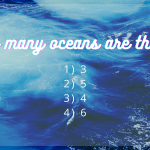What are some good geography questions?
1) What is Earth’s largest continent?
2) What razor-thin country accounts for more than half of the western coastline of South America?
3) What river runs through Baghdad?
4) What country has the most natural lakes?
5) What is the only sea without any coasts?
6) What percentage of the River Nile is located in Egypt?
20 geography questions. Go!
Quiz: Score 15/20 In This Mixed Geography Knowledge Quiz?
Are you a geography enthusiast? Do you think you have what it takes to score 15/20 in this mixed geography knowledge quiz? Test your knowledge of the world's countries, capitals, landmarks, and more with this challenging quiz.
The quiz features a variety of questions that will test your knowledge of geography from around the world. You'll be asked to identify countries on a map, match landmarks to their locations, and answer questions about the world's oceans and continents.
Whether you're a seasoned traveler or just someone who loves learning about the world, this quiz is sure to challenge you. With 20 questions in total, you'll need to be quick on your feet and have a good understanding of geography to score 15/20 or higher.
So, are you ready to put your geography knowledge to the test? Take the quiz now and see how well you do!





